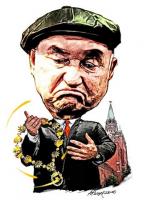STAUNTON, October 4 – Most analysts have suggested that President Dmitry Medvedev’s ouster of longtime Moscow Mayor Yuri Luzhkov represents a clear opening for the opposition either by reshuffling the cards, providing a new leader for that opposition, or by provoking Muscovites into demonstrating over a partial loss of their city’s unique status.
But Grani commentator Irina Pavlova argues that the Kremlin-orchestrated campaign that resulted in the ouster of Luzhkov represents “a crushing defeat” for “the coalition of democratic forces” whose leades have just united under the slogan “For a Russia without Arbitrariness and Corruption” (http://grani.ru/opinion/m.1822...
On the one hand, she writes today, “by initiating a campaign against Luzhkov involving charges of corruption and arbitrariness, the Kremlin seized the main slogans of the opposition,” almost as if the powers that be had taken them more or less unchanged from Nemtsov and Milov’s pamphlet, “Luzhkov. Results.”
And on the other, by so doing and by thus attracting the support of the opposition for what it was doing, the Putin-Medvedev tandem not only transformed its harshest critics into co-conspirators but strengthened the powers that be far beyond what it will gain by appointing a replacement for Luzhkov.
By attacking Luzhkov, she continues, “the Kremlin concealed its own corruption and arbitrariness and showed that it can no worse than any opposition struggle with these ‘weaknesses’ of local chiefs,” thereby winning support for itself from the public and the West without necessarily changing course or liberalizing the country.
All this has certainly worked to the benefit of Medvedev, with even the Moscow organization of the ruling United Russia Party turning to him “with a request that ‘the selected’ (not elected!) candidates for the post of mayor of Moscow” become “information for reflection” by the Russian president.
“Entirely forgotten,” Pavlova points out, “are Medvedev’s previous actions – counter-extremism centers in the interior ministry and the law broadening the powers of the FSB which are intended to strengthen political control in the country, the lengthening of the term of president, the rejection of elections of the chairman of the Constitutional Court and so on.”
Moreover, “having yet again lost to the Kremlin, the liberal opposition has clearly demonstrated that besides general calls for observing the constitution and struggling with corruption and arbitrariness, it does not have a strategy for consistent opposition to the supreme power.”
It lacks, the Grani commentator says, “a program for the defense” of small and mid-size business. It lacks “a strategy for working with other political forces.” It lacks a program for revising the privatization programs of the 1990s. And it lacks any concrete ideas for reducing the gap between the country’s rich and poor.
Pavlova says that it is “striking” that those involved do not seem to be drawing “any lessons from the past,” even though in so many ways Russia seems to be displaying in Merab Mamardashvili’s phrase, “a genius of repetition,” that would appear to suggest that a glance back at the way Russian rulers have behaved earlier would be useful.
Until the recent campaign against Luzhkov began, Pavlova says, she herself did not reflect about the show trials of 1937 against local chieftains, a process that “certain historians have also called ‘democratization’” and one that she suggests she now cannot get out of her head.
“The Stalin-Molotov tandem of that time by several classified telegrams calls for the organization ‘in each oblast by district two to three show trials over the enemies of the people” and to use the local press to mobilize the population for “the struggle with wrecking and those responsible for it.”
When these trials occurred, Pavlova continues, the population was not simply permitted but required to show up and then to declare its complete support for the guilty verdicts that the Stalinist courts handed down, thereby implicating the population in what the powers that be at that time were doing.
But far more serious, she argues, was the reality that “by such open trials, the Stalinist powers that be were covering a more massive terror” against a wide variety of opponents, a terror that also “strengthened the system still further.” And because it had made the people “co-conspirators,” it could present its crimes as reflecting “the moral-political” unity of the country.
And as far as the situation in the country after the local leaders were shot, Pavlova notes, “it did not improve.” Instead, “the participants of these trials – the judges, the witnesses and the invited public, soon themselves fell into the cycle of terror,” with victors on one day becoming the victims on the next.
Under current conditions, “the liberal opposition, which has supported with enthusiasm the campaign against the major of Moscow in the hopes that this will help shake the regime to its foundations and open the way to democratization, should remember the lessons of history,” even if this time around the victims of the process are unlikely to suffer as much.
Luzhkov’s ouster a ‘crushing defeat’ for Russian opposition, Pavlova says
Arvamus
TRENDING

























